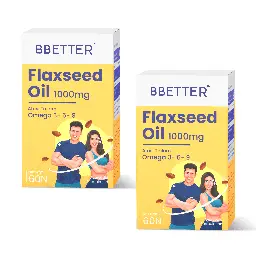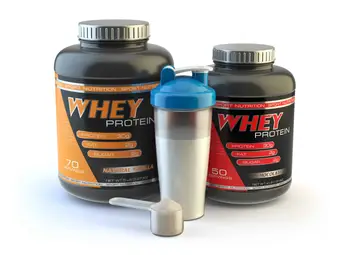What Is The Right Dosage for Omega-3 Supplements?

What Is The Right Dosage for Omega-3 Supplements?
Posted on 19th Jul, 2023
Are you experiencing hair fall, depression, inflammation, or joint pain and stiffness in your body parts?
All these could be a sign of omega-3 deficiency. Moreover, according to the research, people who are deficient in omega-3 often have higher chances of developing Alzheimer’s disease and other cognitive problems.
From regulating inflammation and boosting immunity to supporting heart health and brain function, Omega-3 has important roles to play in our body.
Hence, incorporating Omega-3 supplements into your routine can provide various benefits to your health.
But, how to choose the right Omega-3 supplement, and what are the factors you should consider while selecting omega-3 supplements? Let's explore the steps to help you make an informed decision.
What are the different types of omega-3?
To decide which omega-3 supplement you can buy, first of all, you need to know that omega-3 fatty acids come in different forms. But how do they differ from each other?
- EPA & DHA: EPA (eicosapentaenoic acid) and DHA (docosahexaenoic acid) in omega-3 are found in marine sources and are known for their extensive health benefits.
- ALA: ALA (alpha-linolenic acid), on the other hand, is primarily derived from plant sources.
While all three types of Omega-3 are essential, EPA and DHA are much more beneficial and have more penetrating effects on health than ALA.
And it greatly depends on your dietary choices, health goals, and your health conditions to decide which type of omega-3 supplement you are going to choose.
What are the sources of omega-3 supplements?
Now the next step is to decide on various sources of Omega-3 supplements, depending on your dietary preferences and restrictions.
- Fish oils: Fish oils are the most popular and widely used source of omega-3 fatty acids. It is typically derived from fatty fish such as salmon, mackerel, sardines, and anchovies.
Remember, we discussed EPA and DHA? Omega 3 fish oil supplements are the richest source of EPA and DHA, which you can get online on GetSupp.
- Nuts & seeds: But don't worry, even if you are vegetarian, you still can get the omega-3 fatty acid from Nuts and seeds. Some of the rich sources are Flax seeds, chia seeds, and walnuts, these are particularly rich in ALA, which is a precursor to EPA and DHA.
However, it's important to note that the conversion of ALA to EPA and DHA in the body is limited.
- Krill oil: Krill oil is another source that contains EPA and DHA in the form of phospholipids. Krill oil is believed to have good absorption in our bodies and is safe to use as well. Krill oil supplements are particularly beneficial for heart health, joint health, and brain function.
- Algal oil: Algal oil is another option for individuals who prefer a plant-based or vegetarian source of EPA and DHA. Algal oil supplements provide a direct and sustainable source of EPA and DHA without the need for fish consumption.
- Cod liver oil: Cod liver oil is derived from the livers of codfish and has been traditionally used as a source of omega-3 fatty acids since ages. However, you need to be extra cautious while consuming cod liver oil, as excessive intake can lead to vitamin toxicity.
What is the amount or dosage of omega-3 you need per day?
In the next step of selection for omega-3 supplements, you need to ensure that you are getting the appropriate dosage.
For ALA, a daily intake of 2200mg is recommended.
While for EPA and DHA, a combined dosage of 650mg is generally considered adequate for most individuals.
Choose the form of omega-3 supplement
In order to select the quality omega-3 supplement for your need, you need to be wary of the form of Omega-3 supplement you choose.
You might be thinking why does it matter? Let me tell you, different forms have varying physical-chemical properties that affect their digestion, absorption, and incorporation into human tissues and it can significantly impact their absorption and utilization in your body.
Some common forms include:
Triglycerides,
Ethyl ester form,
Free fatty acids, and
Phospholipids.
These forms are available in different formats such as capsules, soft gels, and liquids. It's important to consider your personal preferences, ease of use, and any dietary restrictions when selecting the form that suits you best.
What is the best omega-3 supplement to take?
WOW Life Science - Omega-3
These omega-3 capsules from WOW Life Science are enriched with EPA and DHA from fish oil. You can place your order directly on GetSupp to reap the benefits such as a healthy heart, improved brain function, and overall well-being.
GNC Triple Strength Fish Oil Omega 3
These GNC Triple Strength Fish Oil Omega 3 capsules are formulated in the USA and are of high quality and purity. It also ensures a significant dosage of EPA and DHA supporting memory and vision with no fishy aftertaste. If you are worrying about toxicity, it is the best omega-3 capsule passing a 5-step purification process.
BBETTER Omega 3 6 9 Flaxseed Oil

BBETTER Omega 3 6 9 Flaxseed Oil Softgels - Vegetarian alternative of Omega 3 fish oil for a healthy Heart & Brain
If you are vegetarian, BBETTER Omega 3 6 9 Flaxseed Oil soft gels are an excellent choice. These capsules contain flaxseed oil, which is a plant-based source of omega-3 fatty acids, promoting a healthy heart and brain.
Conclusion
Having learned how to choose an omega-3 supplement, it's important to realize there is no one-size-fits-all solution.
Hence for selecting the best omega-3 supplement, you should consult with a healthcare professional first to determine which supplement best fits your needs and find out what factors matter most, such as the quality of ingredients and the source of omega-3 fatty acids.
One additional tip would be to look for reputable brands that adhere to strict manufacturing standards and ensures sustainable sourcing methods.

Health articles from our experts

List of Top Whey Proteins for Muscle Gain

Benefits of Protein Powder on Men's and Women's Health

A complete guide on sexual wellness supplements for couples

List of Top 10 Ayurvedic Medicine for Constipation

What Is The Right Dosage for Omega-3 Supplements?

Top 10 Sexual Wellness Supplements Brands in India

The Power of Probiotics: Nurturing Gut Health for Overall Wellbeing

Boosting Libido Naturally: A Guide to Effective Sexual Wellness Supplements

Multivitamins for Hair, Skin, and Nail Health: Enhancing Your Natural Beauty

